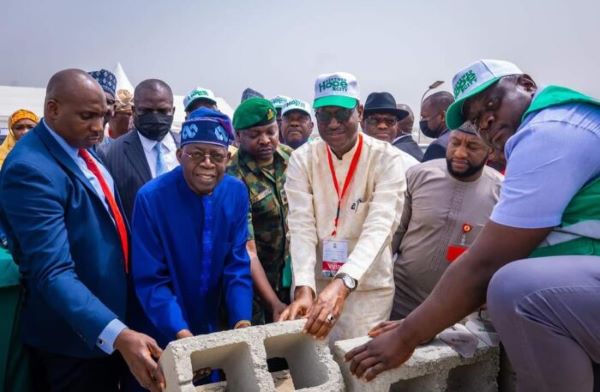NEWS
Housing: 12 Renewed Hope Estates funded from 2023 supplementary budget, says Minister
 The Minister of Housing and Urban Development, Mr Ahmed Dangiwa, has revealed that the Federal Government is funding 12 Renewed Hope Estates through the N50 billion allocation in the 2023 supplementary budget.
The Minister of Housing and Urban Development, Mr Ahmed Dangiwa, has revealed that the Federal Government is funding 12 Renewed Hope Estates through the N50 billion allocation in the 2023 supplementary budget.Dangiwa, represented by Mr Salisu Haiba, Director Press and Public Relations in the ministry, said this at the 2024 conference of the Property and Environment Writers Association (PEWAN) in Lagos.
The theme of the conference is, “Resolving the financial and regulatory dilemma to achieve Renewed Hope Agenda on Housing”.
According to the minister, the ministry has been allocated an additional N27.2 billion in the 2024 budget to fully complete the infrastructure, while awaiting the 2025 budget to expand the programme to cover more states.
He explained that the ministry adopted a range of creative and diversified funding strategies to create impact under the Renewed Hope Agenda of President Bola Tinubu.
He noted that these include increased budgetary allocation, Public-Private Partnerships (PPPs), international collaboration, leveraging Ministry Agency contributions, and launch of the National Social Housing Fund.
He disclosed that the three Renewed Hope Cities in FCT, Lagos and Kano were all being funded through a PPP that the ministry signed with a consortium of developers for the delivery of 100,000 housing units nationwide.
Dangiwa explained that under this strategy, the developers source land and construction finance while the government creates an enabling environment for them to deliver housing.
He said: “So far, the ministry has facilitated a N100 billion bankable offtaker guarantee by the Federal Mortgage Bank of Nigeria (FMBN) for the Karsana Renewed Hope City.
“This has enabled developers to mobilise over N40 billion in financing—a first in the history of Nigeria’s housing sector.
“We have also made cross subsidy a key part of our efforts to enhance affordability for low-medium income earners to foster integrated living.
“Under this concept, the housing units built in the Renewed Hope Cities will be sold at commercial rate.
“Also, a substantial percentage will be sold at concessionary rates to low- and medium-income Nigerians who are members of the Nigeria Labour Congress and the Trade Union Congress.
According to him, the ministry embraced PPPs because the nation’s housing deficit is vast and cannot be funded from budgetary allocation alone.
The minister confirmed that the country needed to build approximately 550,000 units annually over the next decade to close this gap, and this would require about N5.5 trillion per annum.
“However, we recognise that PPPs alone cannot deliver Renewed Hope Affordable Housing for the majority of Nigerians.
“This is due to the high costs of private-sector construction financing, which significantly increase housing prices.
“For example, a one-bedroom apartment at the Renewed Hope City in Karsana, built under a PPP model, costs about N22 million.
“However, a two-bedroom unit under the Renewed Hope Estates, funded through budgetary allocations, costs about N12.2 million.
“The difference lies in the cost of finance. Under the Renewed Hope City model, developers purchase the land, secure financing at double-digit interest rates.
“While as a government, we facilitate a Bankable Offtaker Guarantee from the FMBN.
“In contrast, Renewed Hope Estates are funded with interest-free allocations from the budget. State governments provide free land, and infrastructure costs are subsidised and excluded from the housing unit prices.
“These factors account for the significant price disparity between Renewed Hope Cities and Renewed Hope Estates,” he said.
According to him, there is widespread recognition that the current N50 billion annual budget for housing is grossly inadequate, compared to the N5.5 trillion required annually to address the housing deficit.
Dangiwa said, to this end, the ministry had engaged the National Assembly leadership and received their support for increasing the annual housing budget to a minimum of N500 billion, starting with the 2025 budget cycle.
He expressed hope that this would allow the ministry to expand housing projects to cover the remaining 18 states and increase the unit count per state from 250 to at least 500, as initially planned.
The minister acknowledged that funds put into housing construction are revolving, because the houses will be sold and the money put back in government coffers for subsequent housing construction.
He noted that beyond this, housing construction plays a huge role in job creation and poverty alleviation, adding that this huge economic impact must be put into proper context.
“The housing sector’s potential as a driver of economic growth is evident in the job opportunities that the Renewed Hope Cities and Estates Programme have created.
“At an average of 25 jobs per house, the ongoing projects have directly and indirectly generated over 252,800 jobs for Nigerians, including skilled and unskilled workers.
“At an average daily wage of N5,000, many workers are earning over N150,000 monthly, which is far above the national minimum wage.
“From professionals such as architects, civil engineers, surveyors and skilled workers like masons, carpenters, electricians, plumbers, steel fixers, welders, labourer, security personnel, concrete pourers and excavation workers, the Renewed Hope Cities and Estates is unlocking the potential of housing construction.
“This is because it servea as a veritable source of good paying jobs that are taking our youths off the streets and reducing the temptation to indulge in criminal activities,” he said.
In her welcome address, PEWAN’s Chairperson, Mrs Okwy Iroegbu-Chikezie, said that Nigeria had become entangled in the twin issues of housing deficit and high vacancy rate in the real estate sector which appears as an anathema.
Iroegbu-Chikezie, stated that with increasing cost of building materials, occasioned by high inflation, interest rates and the excruciating impact of the present economy, homeownership has become an enormous challenge to many.
“It is therefore our expectations that the conference will provide opportunity for experts and stakeholders in the real estate to chart pathways towards increasing housing provision in the country to bridge housing deficit,”she said.








